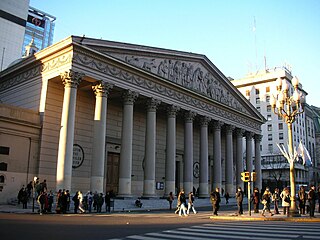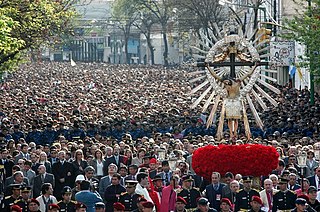
The Catholic Church in Argentina is part of the worldwide Catholic Church, under the spiritual leadership of the Pope, the Curia in Rome, and the Argentine Episcopal Conference.

Catholic higher education includes universities, colleges, and other institutions of higher education privately run by the Catholic Church, typically by religious institutes. Those tied to the Holy See are specifically called pontifical universities.

Argentina, for much of its history and including the present day, has been an overwhelmingly Christian country. The largest Christian denomination in the country is Roman Catholicism. The historical background is very much due to the Spanish influence brought about through the newly conquered territories. However, immigration throughout the 20th century has brought other Catholics and denominations from various regions to Argentina. Overall, a 2008 survey found that 24% attended religious services regularly, and that 10.3% described themselves as atheist, agnostics, or having no religion. Only 35% of Argentines consider religion to be very important in their lives according to a 2015 Pew Research Center report. Argentina is also home to the largest Muslim community in Latin America, numbering at around 400,000 people or 1% of the total population.
A pontifical university is an ecclesiastical university established or approved directly by the Holy See, composed of three main ecclesiastical faculties and at least one other faculty. These academic institutes deal specifically with Christian revelation and related disciplines, and the Church's mission of spreading the Gospel, as proclaimed in the apostolic constitution Sapientiachristiana. As of 2018, they are governed by the apostolic constitution Veritatis gaudium issued by Pope Francis on 8 December 2017.
Universidad Católica, Spanish for "Catholic university", may refer to:
An undergraduate degree is a colloquial term for an academic degree earned by a person who has completed undergraduate courses. In the United States, it is usually offered at an institution of higher education, such as a college or university. The most common type of these undergraduate degrees are associate's degree and bachelor's degree. Bachelor's degree typically takes at least three or four years to complete. In some other educational systems, undergraduate education is post-secondary education up to the level of a master's degree; this is the case for some science courses in Britain and some long-cycle medicine courses in Europe. These degrees can be categorised as basic or first professional degrees.

Antonio Quarracino was a Cardinal of the Roman Catholic Church of Argentina and the Archbishop of Buenos Aires between 1990 and 1998.

The Pontifical Catholic University of Argentina, whose full name in Spanish is Pontificia Universidad Católica Argentina "Santa María de los Buenos Aires", also known as Universidad Católica Argentina (UCA), is a university in Argentina with campuses in the cities of Buenos Aires, Santa Fe, Rosario, Paraná, Mendoza and Pergamino. The main campus is located in Puerto Madero, one of the most modern neighborhoods of Buenos Aires.

Antiguo Oriente is an annual peer-reviewed academic journal published by the Center of Studies of Ancient Near Eastern History (CEHAO). It is one of the few scholarly journals in the Spanish-speaking world that focus on the ancient Near East.

The National University of Mar del Plata is an Argentine national university in the city of Mar del Plata, on the Atlantic coast.
Ancient Near East studies is the field of academic study of the Ancient Near East (ANE). As such it is an umbrella term for Assyriology, in some cases extending to Egyptology.
Facultades de Filosofía y Teología de San Miguel is a Jesuit university and seminary in San Miguel, Buenos Aires Province, Argentina.

Abraham Skorka is an Argentine biophysicist, rabbi and book author. Abraham Skorka is rector of the Seminario Rabínico Latinoamericano in Buenos Aires, the rabbi of the Jewish community Benei Tikva, professor of biblical and rabbinic literature at the Seminario Rabinico Latinoamericano and honorary professor of Hebrew Law at the Universidad del Salvador, Buenos Aires.

Delia Crovi Druetta is a professor and researcher in communications and Latin American studies at the Universidad Nacional Autónoma de México, member of the Sistema Nacional de Investigadores, Level III.

Alicia Dickenstein is an Argentine mathematician known for her work on algebraic geometry, particularly toric geometry, tropical geometry, and their applications to biological systems. She is a full professor at the University of Buenos Aires, a 2019 Fellow of the American Mathematical Society, a prior vice-president of the International Mathematical Union (2015–2018), and a 2015 recipient of The World Academy of Sciences prize.
Elba Perla Fuscaldo is an Argentinian Egyptologist, specialist of the ceramics of the Ancient Egypt.
Alicia Daneri Rodrigo is an Argentine Egyptologist who earned a doctorate at the Universidad de Buenos Aires.

The Institute of Social Sciences Research is an excellence research center of the Pontifical Catholic University of Argentina and Associated Unit of the CONICET located in Buenos Aires, Argentina, dedicated to research in the field of the social sciences and the humanities.

Damqatum is an annual academic journal published by the Center of Studies of Ancient Near Eastern History (CEHAO). dedicated to the history and archaeology of the Near East, from the Palaeolithic to the Ottoman period. The journal publishes articles for the general public, interviews with prominent researchers as well as news about academic activities.













